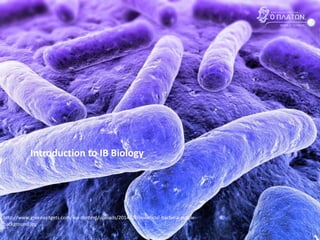
Introduction to IB Biology
- 1. Introduction to IB Biology http://www.greenasitgets.com/wp-content/uploads/2014/09/beneficial-bacteria-purple- background.jpg
- 2. So what is science? “the intellectual and practical activity encompassing the systematic study of the structure and behavior of the physical and natural world through observation and experiment.” “Middle English (denoting knowledge): from Old French, from Latin scientia, from scire ‘know” (google.com) Observation? Experiment? The underlying assumption of science is that the universe has an independent, external reality accessible to human senses and amenable to human reason.
- 3. Science (is): Exciting useful ongoing asks questions about the natural world aims to explain and understand works with testable ideas relies on evidence embedded in the scientific community Participants in science behave scientifically http://undsci.berkeley.edu/article/0_0_0/whatisscience_01
- 4. Homework and in-class tasks The keywords shown before have been taken from a website shown here. Split in groups of two or three. Choose two or three keywords, mine information from the website and present them in class. Presentations are due Thursday. Lets see what you know about in-class presentattions. http://undsci.berkeley.edu/article/0_0_0 /whatisscience_01
- 5. Homework and in-class tasks Is Astrology a science? Read the relevant webpages from the University of Berkley. Then, use the science checklist (How scientific is it) and try to see how many ticks you will get for Astrology For every statement of the science checklist you have to write a small paragraph explaining why you chose to tick or why you didn’t tick it Homework due next Monday http://undsci.berkeley.edu/article/ 0_0_0/whatisscience_03
- 6. Scientists use a wide variety of methodologies which taken together, make up the process of science. There is no single “scientific method”. The scientific method Scientists have used, and do use, different methods at different times to build up their knowledge and ideas but they have a common understanding about what makes them all scientifically valid. https://upload.wikimedia.org/wikipedia/commons/1/1a/Scientists_use _a_low_temperature_scanning_electron_microscope_(LT- SEM)_to_view_anatomical_structures_needed_to_identify_nematodes _like_the_Parasitorhabditis_-_USDA-ARS.jpg
- 7. How science works: the flowchart http://undsci.berkeley.edu/article/scienceflowchart
- 8. Science and the nature of science – elements of ToK What is science and what is the scientific endeavour? The understanding of science (theories, laws etc) The objectivity of science The human face of science Scientific literacy and the public understanding of science http://www.clivecouldwell.com/images/scienc e_cartoon.jpg
- 9. So what is Biology?? https://upload.wikimedia.org/wikipedia/commons/1/13/Legionella_p neumophila_(SEM)_2.jpg
- 10. So what is biology? Simplistically, Biology is the study of life. the study of living organisms, divided into many specialized fields that cover their morphology, physiology, anatomy, behavior, origin, and distribution. (google.com) The first organisms appeared on the planet over 3 billion years ago and, through reproduction and natural selection, have given rise to the 8 million or so different species alive today. This diversity makes biology both an endless source of fascination and a considerable challenge.
- 11. "Nautilus". Licensed under CC BY-SA 2.5 via Wikimedia Commons - https://commons.wikimedia.org/wiki/File:Nautilus.jpg#/media/File:Nautilus.j pg "Monocelis fusca 2" by Christopher Laumer - http://www.flickr.com/photos/89882529@N00/4563532237/i n/set-72157624081798388/. Licensed under CC BY 2.0 via Wikimedia Commons - https://commons.wikimedia.org/wiki/File:Monocelis_fusca_2 .jpg#/media/File:Monocelis_fusca_2.jpg http://ww2.valdosta.edu/~jlgoble/Sea%20Anemo ne%20Diadumene%20Dia%2030cm%201.JPG STRUCTURE
- 12. FUNCTION Division in bacteria Mitosis
- 13. Levels of organization Emerging properties Exercise in-class
- 14. Ok, so where do we start from?? – Objectives 1. appreciate scientific study and creativity within a global context through stimulating and challenging opportunities 2. acquire a body of knowledge, methods and techniques that characterize science and technology 3. apply and use a body of knowledge, methods and techniques that characterize science and technology 4. develop an ability to analyse, evaluate and synthesize scientific information 5. develop a critical awareness of the need for, and the value of, effective collaboration and communication during scientific activities IB-Biology guide
- 15. The assessment objectives 1. Demonstrate knowledge and understanding of: a. facts, concepts and terminology b. methodologies and techniques c. communicating scientific information. 2. Apply: a. facts, concepts and terminology b. methodologies and techniques c. methods of communicating scientific information. 3. Formulate, analyse and evaluate: a. hypotheses, research questions and predictions b. methodologies and techniques c. primary and secondary data d. scientific explanations. 4. Demonstrate the appropriate research, experimental, and personal skills necessary to carry out insightful and ethical investigations. IB-Biology guide
- 16. Structure of the material IB-Biology guide
- 17. Structure of the material IB-Biology guide
